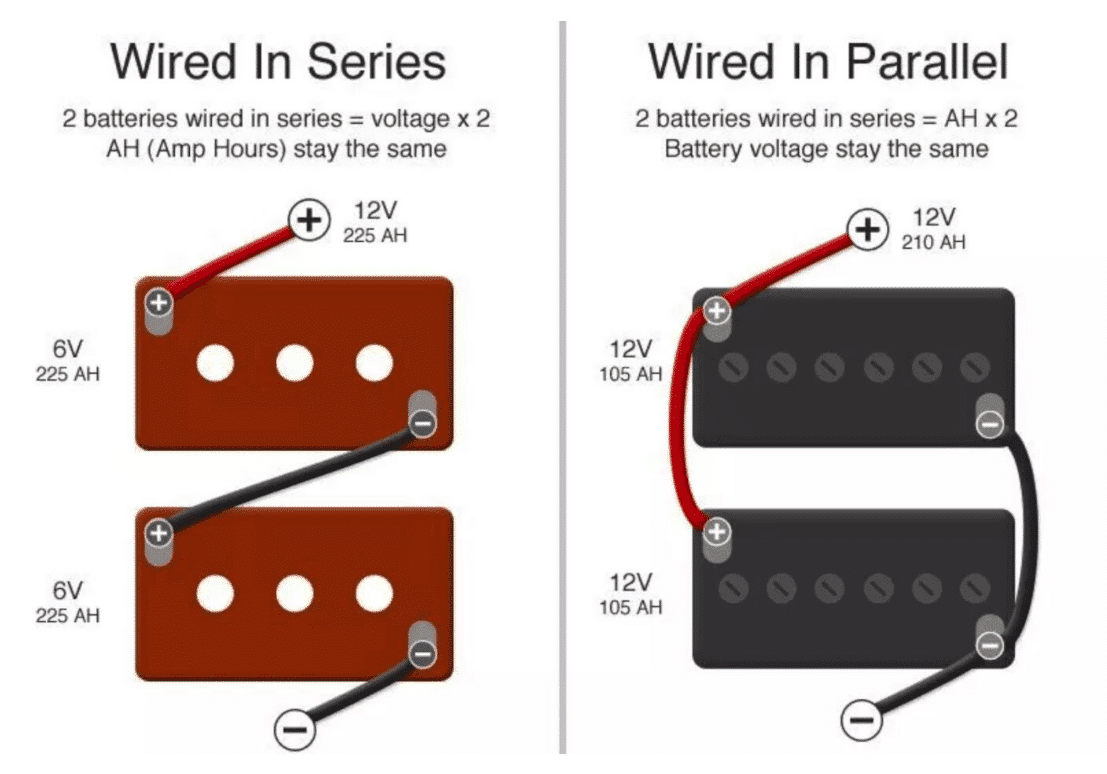As the demand for efficient and reliable energy storage solutions grows, many users are exploring the potential of connecting lithium batteries in parallel configurations. This article will provide a comprehensive overview of the benefits, considerations, and best practices for connecting four lithium batteries in parallel. By understanding these factors, we can optimize performance and ensure safety in various applications.
Understanding Parallel Connections in Lithium Batteries
Connecting batteries in parallel involves linking multiple batteries together to increase the overall capacity while maintaining the same voltage. This configuration is particularly beneficial for applications requiring extended run times or higher current outputs.
Key Benefits of Connecting Batteries in Parallel
- Increased Capacity: When batteries are connected in parallel, their capacities (measured in amp-hours, Ah) add together. For example, connecting four 100Ah batteries results in a total capacity of 400Ah.
- Improved Current Handling: Parallel connections allow for higher current outputs, making them suitable for applications with high power demands.
- Redundancy: If one battery fails, the others can continue to provide power, enhancing system reliability.
Considerations When Connecting Lithium Batteries in Parallel
While connecting lithium batteries in parallel offers numerous advantages, certain considerations must be taken into account to ensure optimal performance and safety.
Wholesale lithium golf cart batteries with 10-year life? Check here.
1. Battery Matching
When connecting batteries in parallel, it is crucial to use batteries of the same type, capacity, and age. Mismatched batteries can lead to imbalances that may cause:
Want OEM lithium forklift batteries at wholesale prices? Check here.
- Reduced Performance: Differences in capacity can result in uneven discharge rates.
- Shortened Lifespan: Over time, mismatched batteries may degrade faster than others due to unequal cycling.
2. Proper Wiring Techniques
Using appropriate wiring techniques is essential for ensuring safe and efficient connections:
- Use Adequate Gauge Wire: Select wire sizes based on the expected current load to minimize voltage drops and heat generation.
- Ensure Secure Connections: All connections should be tight and free from corrosion to maintain good conductivity.
3. Battery Management System (BMS)
Implementing a Battery Management System (BMS) is highly recommended when connecting multiple lithium batteries in parallel. A BMS helps monitor:
- Voltage Levels: Ensures that all batteries are charged and discharged evenly.
- Temperature Management: Protects against overheating by monitoring battery temperatures.
- State of Charge (SoC): Provides real-time information on battery health and charge status.
Best Practices for Connecting Four Lithium Batteries in Parallel
To maximize the benefits of connecting four lithium batteries in parallel, we recommend following these best practices:
1. Choose High-Quality Batteries
Select high-quality lithium batteries from reputable manufacturers. This choice ensures reliability and longevity, reducing the risk of failure or performance issues.
2. Install a BMS
As mentioned earlier, using a BMS is essential for maintaining balance among the connected batteries. It helps prevent overcharging and deep discharging, which can significantly impact battery life.
3. Regular Maintenance Checks
Conduct regular maintenance checks to monitor battery health and performance:
- Inspect Connections: Look for signs of corrosion or loose connections.
- Check Voltage Levels: Periodically measure voltage levels across each battery to ensure even charging and discharging.
4. Monitor Temperature
Keep an eye on battery temperatures during operation. High temperatures can lead to reduced efficiency and potential safety hazards.
Data Chart: Comparison of Battery Configurations
| Configuration Type | Total Voltage | Total Capacity | Advantages | Disadvantages |
|---|---|---|---|---|
| Single Battery | 12V | 100Ah | Simple setup | Limited capacity |
| Two Batteries in Series | 24V | 100Ah | Higher voltage | Complex charging requirements |
| Four Batteries in Series | 48V | 100Ah | Ideal for high-voltage applications | Requires matching batteries |
| Four Batteries in Parallel | 12V | 400Ah | Increased capacity | Imbalance risks if not managed |
Latest News on Lithium Battery Technology
As of October 2024, advancements in lithium battery technology continue to evolve rapidly. Recent developments include:
Enhanced BMS Technologies
New Battery Management Systems are being developed with advanced features such as wireless monitoring and integration with smart home systems. These innovations enhance user control over battery performance and health.
Sustainable Manufacturing Practices
The industry is increasingly focusing on sustainable manufacturing practices to reduce environmental impact. This shift includes using recycled materials and improving energy efficiency during production.
FAQs About Connecting Lithium Batteries in Parallel
1. Can I connect different brands of lithium batteries in parallel?
It is not recommended to connect different brands unless they have identical specifications (capacity, voltage, chemistry) to avoid imbalances.
2. How do I calculate total capacity when connecting batteries?
Total capacity is calculated by adding the capacities of all connected batteries together while maintaining the same voltage.
3. What happens if one battery fails?
If one battery fails, it can affect the overall performance of the system. A BMS can help mitigate this issue by isolating the faulty battery if necessary.
4. Is it safe to connect multiple lithium batteries without a BMS?
While it is technically possible, it is highly discouraged as it increases risks related to overcharging, overheating, and imbalanced discharges.
Conclusion: Connecting Four Lithium Batteries in Parallel Safely
In conclusion, connecting four lithium batteries in parallel can be an effective way to enhance energy storage capacity and improve performance for various applications. By following best practices regarding battery matching, wiring techniques, and implementing a robust Battery Management System (BMS), we can ensure a safe and efficient setup that maximizes the benefits of this configuration.At Redway Battery, we specialize in manufacturing high-quality lithium LiFePO4 batteries tailored to meet diverse needs across various applications. For quick quotes on custom solutions or wholesale inquiries, feel free to contact us today!







